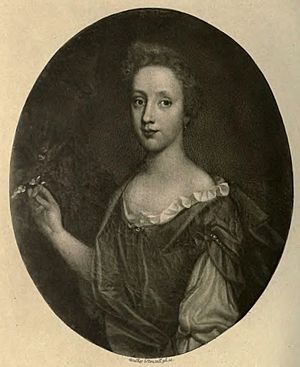Anne Wharton facts for kids
Quick facts for kids
Anne Wharton
|
|
|---|---|

portrait by Peter Lely
|
|
| Born | Anne Lee 20 July 1659 Ditchley Park, Oxfordshire, England |
| Died | 29 October 1685 (aged 26) East Adderbury, Oxfordshire, England |
| Occupation | poet & verse dramatist |
| Language | English |
| Nationality | English |
| Notable works | Love's Martyr |
| Spouse | Thomas Wharton |
Anne Wharton (born Anne Lee, 20 July 1659 – 29 October 1685) was an English poet. She also wrote plays in verse. Most of her writings were not published while she was alive. However, about 45 of her poems and plays are known today.
Contents
Her Life Story
Anne Lee was born on 20 July 1659. Her birthplace was Ditchley Park in Oxfordshire, England. She came from a very rich family. Her father, Sir Henry Lee, had passed away before she was born. Her mother, Anne Danvers, died soon after Anne was born.
Anne and her sister, Eleanor, grew up at Adderbury House. They lived with the mother and grandmother of John Wilmot, 2nd Earl of Rochester. He was a famous poet and Anne Wharton's uncle.
On 16 September 1673, Anne married Thomas Wharton. He was a politician. They did not have any children.
Her Passing
Anne Wharton died on 29 October 1685. She passed away in Adderbury, Oxfordshire. She was at her sister Eleanor's house.
Her Writings
Anne Wharton is remembered for her play Love's Martyr; or, Witt above Crowns. She also wrote many lyrical poems. These are poems that express strong feelings. She also wrote biblical paraphrases. These are versions of Bible stories told in her own words.
Only one of her works was published during her lifetime. This was a heartfelt poem about the death of her uncle, Rochester. She used the pen name Urania for this poem. Other famous writers, like Edmund Waller and Aphra Behn, praised her poem. Aphra Behn even wrote a poem back to Anne.
In 1997, a special collection of 34 of Anne Wharton's works was published. Since then, at least eleven more of her poems have been found. Her "Elegy on the Earl of Rochester" can be found in a well-known poetry book. Another poem, "A Paraphrase on the Last Speech of Dido in Virgil's Aeneis," is also in an anthology.
A Song
How hardly I concealed my Tears?
How oft did I complain?
When many tedious Days, my Fears
Told me I Loved in vain.
But now my Joys as wild are grown,
And hard to be concealed:
Sorrow may make a silent Moan,
But Joy will be revealed.
I tell it to the Bleating Flocks,
To every Stream and Tree,
And Bless the Hollow Murmuring Rocks
For Echoing back to me.
Thus you may see with how much Joy
We Want, we Wish, Believe;
'Tis hard such Passion to Destroy,
But easy to Deceive.
 | Charles R. Drew |
 | Benjamin Banneker |
 | Jane C. Wright |
 | Roger Arliner Young |

